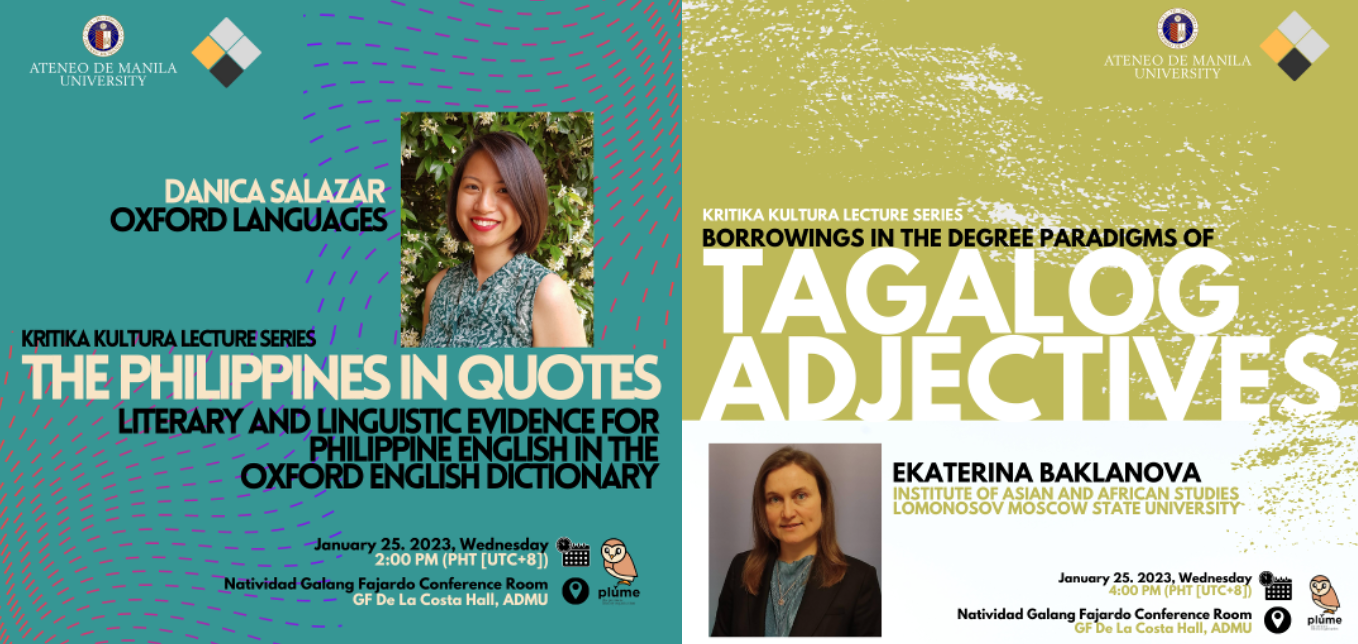
January 19, 2023
Kritika Kultura invites the public to two lectures on January 25, 2023, Wednesday, at Natividad Galang Fajardo Conference Room, De La Costa Hall. Please register via https://bit.ly/Jan25KKLectures by January 24, Tuesday.
2:00 PM (PHT [UTC+8])
The Philippines in Quotes: Literary and Linguistics Evidence for Philippine English in the Oxford English Dictionary
Abstract. The Oxford English Dictionary (OED), widely regarded as the most authoritative dictionary of the English language, contains information on the meaning, history, and pronunciation of over 600,000 words—past and present—from across the English-speaking world, exemplified by nearly three million quotations. This presentation will look at the way the Philippine variety of English has been represented in the OED, focusing primarily on the quotations illustrating Filipino entries in the dictionary. These quotations come from a wide variety of written sources, from novels and academic journals to newspapers and magazines, to blogs and tweets. They represent the whole chronological breadth of English in the Philippines, from its widespread local use in the present day, going back to the time of its initial introduction to the islands by its American colonizers, and to an even earlier period when the archipelago appeared in various European navigational accounts written in or translated into English. The talk will highlight the Filipino publications and authors cited in the OED whose writing provides evidence of the distinctive vocabulary of Philippine English, and examine what these quoted works reveal about Philippine literature, history, and culture.
Lecturer. Dr Danica Salazar is Executive Editor for Oxford Languages, where she leads editorial projects for world varieties of English. She also researches and writes World English entries for the Oxford English Dictionary, and represents Oxford Languages in lectures and conferences, as well as in international print and broadcast media. Prior to joining Oxford University Press, she was the Mellon Postdoctoral Fellow in English Language Lexicography at the English Faculty and Hertford College of the University of Oxford. She holds a doctorate degree in Applied Linguistics (sobresaliente) from the University of Barcelona, a Master’s degree in Teaching Spanish as a Foreign Language (sobresaliente cum laude) from the University of Salamanca and a Bachelor of Arts degree in European Languages (Spanish and French, magna cum laude) from the University of the Philippines-Diliman.
4:00 PM (PHT [UTC+8])
Borrowings in the Degree Paradigms of Tagalog Adjectives
Abstract. The report presents the results of a case study of the degree system in the contemporary Tagalog, as well as the impact of Spanish and English as donor languages on this system. A number of well-known works on the grammar of Tagalog (Schachter & Otanes 1972; De Guzman 1996; Malicsi 2013; Cena 2014) show differences both in approaches to characterizing the degree paradigm of Tagalog adjectives and in the scope of its inventory items considered. The impact of Spanish and English borrowings on the whole system of degrees in Tagalog adjectives has not yet received any particular attention. Following the approach by Igor Melchuk (1998) I have attempted to describe this system as consisting of the adjectival paradigms of intensity category and comparison category. The impact of Spanish and English borrowings in these two paradigms has been analyzed based on the Leipzig Corpus of Tagalog (2017) and a range of publications. It will be shown that the inventory of the intensity paradigm of Tagalog has been enriched with a Spanish-derived Moderative Marker as well as two Spanish and two English-derived Elative Markers. In the comparison paradigm which includes Comparative, Superlative, Equative, and hypothetically also an “Inferior” degree forms, Spanish Comparative marker mas prevails, while pareho/parehas has been adopted as another Equative degree marker. Along with the native Relator sa, two borrowed Relators kaysa and kumpara sa are part of the Tagalog comparison inventory. Finally, it is suggested that the use of mas as a double-marker in comparison of inequality may indicate a tendency to grammaticalization of mas towards a general “comparison of inequality” marker.
Lecturer. Dr Ekaterina Baklanova is a Senior Research Fellow at the Institute of Asian and African Studies of Lomonosov Moscow State University (Russia), where she also obtained her PhD in 2010. Her major scholarly interests concern Tagalog linguistics, particularly language contact, contact-induced changes and morphology. Her research activities also include History of the Philippine Literature, Contemporary Philippine Literature and Malay Linguistics. Ekaterina Baklanova currently teaches Tagalog/Filipino Language, Philippine Literature and Linguistics at the IAAS of Lomonosov Moscow State University. She has publications in various journals and collections about borrowing and contact-induced change in Tagalog and some of its grammatical features, as well as about the Philippine literature and culture.
